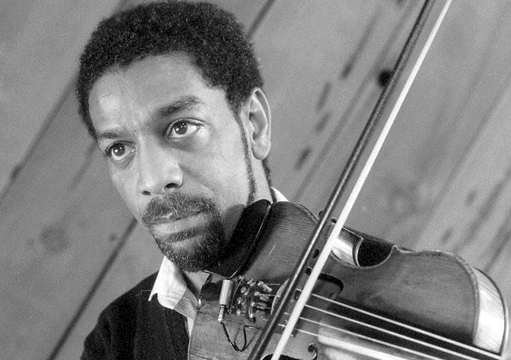I remember the first time I heard Billy Bang. As I prepared my radio show in the once-robust music library at the WDET studios, fellow music host W. Kim Heron was airing his Sunday night avant-jazz-centric show in Studio A. Heron would drop some of the most amazing, out-there cuts, and his gift was on full display when he shared “Summer Night (with Crickets)”.
Starting off in a playful, drum-laden frolic, the cut quickly gave way to some of the most complex, soulful expressions I’d ever heard from a violin. I had to know who was playing. Billy Bang, I was told, and fortunately for me, the record was secured safely within the vast shelves of the music library. How had I not heard his music before? My mission was clear. I must share his music and learn more about his story.
It didn’t take long for me to discover a recording Bang did with Sun Ra called A Tribute to Stuff Smith (below). The record, with John Ore and Andrew Cyrille, paid tribute to another jazz violinist not talked about nearly enough, Stuff Smith. The result, bearing the swing style that Smith is known for, is relatively straightforward and earnest.
Considering the out-there places each musician could soar to on his own, the level of playing on A Tribute to Stuff Smith exhibits a kind of virtuosity that is down to earth and comes straight from the heart. It is mesmerizing to consider that Bang’s only formal training was during his grade-school years in Harlem.
Even that brief musical education was cut short when he transferred to the private, now-closed Stockbridge School in Massachusetts. It didn’t have a music program, so neither did Bang. (Interestingly, after his stay at Stockbridge, the school added classical music listening sessions as part of its regular routine.)
After transferring to yet another school in the Bronx, it’s unclear whether he picked up the violin after his Harlem years. Then, it was Vietnam that took the center stage. It was only after Vietnam that he purchased a violin at a pawn shop and resumed playing.
Like any great musician, Bang reached into his life experiences to create his sound. His mental state suffered from serving in Vietnam, leading to a bout with alcohol and drugs. He embraced the avant-garde jazz scene and continued to play with Sun Ra and other musicians associated with the sound. Bang studied directly with violinist and composer Leroy Jenkins.
It really wasn’t until Bang was convinced to create a record series dedicated to his traumatic time in Vietnam did he finally begin to heal. 2001’s Vietnam: The Aftermath was born, which also featured musicians who served in Vietnam.
There would be two attempts at a documentary about Bang. First, with Redemption Song, and more recently with Lucky Man (below). (Lucky Man seems to incorporate several of the same elements from Redemption Song.) We get a glimpse of his life and what motivated him to create with such a singular vision.
Bang only lived until age 63, a life cut short for someone with such vision and determination.
I don’t know what became of Changing Seasons in the radio station’s music library. I’ve often wanted to share it on my radio show today on dublab. Long out of print, I’ve yet to run into a copy of my own. But I’ve still never heard anything quite like it, no matter what the season.
Top Image: Billy Bang at Bach Dancing & Dynamite Society, Half Moon Bay CA 8/24/86 w/William Parker, bass; Oscar Sanders, guitar; Zen Matsuura, drums © Brian McMillen www.brianmcmillenphotography.com
